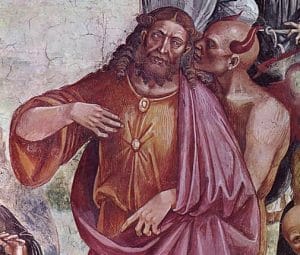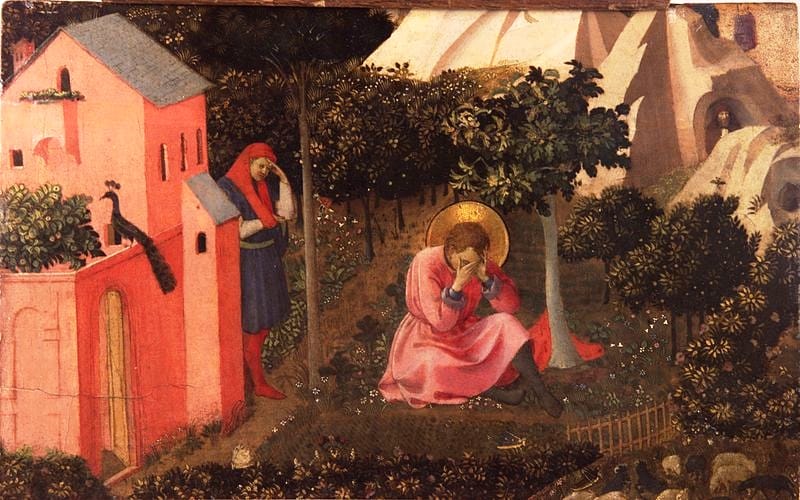One of the themes that St. Paul reflects upon in his letter to the Romans is the role that Sin plays in Divine Providence. He does not say it using those terms directly, but it is clear from his statement that God “where sin abounds, grace superabounded” (Rom 5:20) that there is an important reflection for the Romans (and us) to make related to Sin in their own lives. It is this theme that I would like to take up here.
Recall what has been said a number of times previously in regards to Providence. It has two dimensions or aspects. The first relates to God’s overall plan for Creation. At the center of the plan is Christ. This is why St. Paul keeps coming back to the typological relationship between Christ and Adam in Romans 5-7. The sin of Adam becomes the type of all sin and becomes in a very real sense the cause of the Incarnation. I am not taking sides in the Scholastic debate over whether the Son would have become man if there was no sin, only dealing with reality as we have it.
Adam’s Sin and God’s Providence
What we very often don’t think about is that God could have stopped Adam from sinning. And He could have done so in a way that still protected Adam’s freedom of choice. He could have stopped the Devil from entering into the Garden. He could have given Adam an actual grace by which his intellect or will were strengthened against the temptation of the Devil. He could have inspired Adam to pray against the temptation. He could have sent His Guardian Angel to crush the head of the serpent. He could have continually done this so that Adam never sinned (this is exactly what he did with Mary) and Adam would have been the freest human person ever.
So, then we must ask why God permitted Adam to sin. Permitted is the key word because God did not cause Him to sin. Yet He chose not to stop him and so there must have been some good that otherwise would not have been. That good was the Incarnation of His Only Begotten Son. Again, this is not an answer to the debate, but a fact that it was better for the Son of Man to save us from our sins than to be merely incarnated. It reveals something of God and His glory that otherwise would not have been shown forth.
It is also a fact that God permitted that particular sin of Adam. Again, Adam could have fallen any number of ways. But God allowed that particular sin with all its circumstances for a very specific reason. Adam sinned exactly as he did because it brought about and prefigured the specific act of redemption God wanted. Felix culpa! “O happy fault that merited so great of a Redeemer.”

But Adam was not a mere pawn or instrument in the divine economy. God also had Adam’s good in mind when He permitted him to fall exactly as he did. This does not mean that Adam received the good, only that God allowed his sin in order to give him some good. It is impossible to know what the specific good or goods that God would give to Adam as a consequence of that particular sin, but one can readily see how this would be possible. For Adam needed humility and trust in God’s Providence, both of which could have been given to him as a consequence of his sin. God would not permit the sin to happen if there was not some personal good that was also possible.
Admitting the possibility though does not mean that Adam received the consequent goods. Repentance is the gateway to receiving those goods. This is what St. Paul means when he cautions the Romans not to think that grace was a direct result of the sin (Romans 6:1). It is a result of God’s omnipotence that He can bring good from our sins. For sin is literally nothing and only God can bring good from nothing. Try as we might, we can never do evil and expect good to come from it.
Providence’s Second Dimension
What we have been discussing is the other way in which sin plays a role in God’s Providence—personally. God’s Providence is not just in His governance of the world as a whole, but also His governance of the world as if you are the only one that matters. He will not cease providing you and me with what we need at each and every moment of our lives. It is a direct effect of His wisdom and His love; wisdom in His governance of all things for my personal benefit and His ceaseless willing of my good. God doesn’t just will my good generically, but personally and at each and every moment of my life.
While we might intellectually assent to this, we cannot realize it without asking why God permits us to fall into some sins and not others? Most certainly there are sins from which we personally could never escape. Those seem not to plague. Others keep us humble and aware enough of our faults that we do not sin in more serious ways. Others help us eventually to see that we have been trapped by a lie of the Evil One. Not sure why God permitted it, ask Him.
This is a spiritually fruitful practice not just because it helps us to grow in self-knowledge, but also because it helps us to see what God wants to give us and heal us from. In order for this to happen we cannot hide in shame from our sins or try to rationalize them away. Trusting in God’s mercy we must face them head-on in a spirit of repentance. Once repented, we are opened to receiving the greater grace within God’s permission. As St. Thomas says in a gloss on Romans 5, some sinners “by the help of divine grace are humbled when they consider their sins and so obtain a greater grace (Ps 16:4)”. In short, when we sin we must run to repentance and filled with both sorrow and love, anticipate the good that God has for us



















